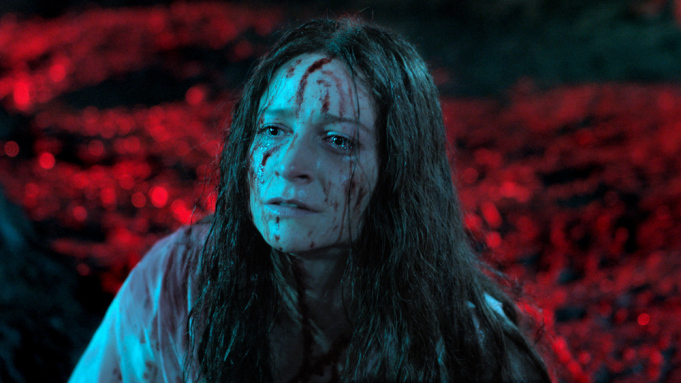What to Watch Verdict
'Censor' starts by addressing the storied misdirections towards violence in media, then becomes a gleeful exploiter of violence in media that executes horror with a topical edge.
Pros
- +
🩸 Misdirects nicely.
- +
🩸 Develops a conflict amidst recognizable commentaries.
- +
🩸 Niamh Algar as a censor with trauma.
- +
🩸 Thoughtful and tense.
Cons
- -
🩸 Narrative wires cross a wee bit in the middle.
- -
🩸 Throws itself into madness (hope you can swim in the deep end.)
- -
🩸 Walks before it sprints.
Censor is part of our Sundance 2021 coverage. You can find all of our reviews here.
As a movement reassessment, Censor approaches conversations around “gratuitousness” in media and professional expressions like Knife + Heart or Berberian Sound Studio. Its genre critique similarly wades these crimson waters and shifts focus onto the United Kingdom’s governed overseeing of violent content that led to the infamous banned “Video Nasties” roster. Director and co-writer Prano Bailey-Bond approach misconceptions and side-effects of censorship by taking us into the belly of the judgmental beast. By centering the narrative around a film censor hacking her way through go-go-gore flicks pushing societal boundaries, themes unfurl about how these “securities” did nothing to shield from the real monsters of our world. Who censorship protects, where it distracts from, and what can hide behind these frontline “safeguards.”
As a genre reviewer who’s spent many a Thanksgiving answering questions from relatives who ponder aloud what all those “gross, stupid kill flicks” are doing to my psyche, I very much appreciate the adverse reality Censor maintains.
A knockout Niamh Algar stars as feature film censor Enid Baines, who spends her days trimming genital mutilation scenes and ruling on whether the “worst” cinematic slaughterfests should release to public viewers. Films like Deranged, where faces are devoured like removed flesh pancakes. It’s a disgusting job, but one that distracts Enid from her sister's disappearance when they were children. Her instinct will not believe Nina is deceased, holding out reunion hopes. Then, during an assessment of Frederick North’s (Adrian Schiller) Don’t Go Into The Church, Enid swears she glimpses her sister's adult maturation in the lead actress. Was Nina abducted and turned into a scream queen? The truth, hopefully, will set Enid free.
Bailey-Bond cracks a code with Censor that signals the deception of prudeness and ethical values flaunted by high-society while still upholding its own damning, delirious descent into madness. Enid is an agent of morality with a vanished sister and mental blockages that refuse to clarify what happened years ago. The mysteries Bailey-Bond and collaborating author Anthony Fletcher present expose falsities around life imitating art because, well, art imitates life. Anything projected onto theater screens stems from worldly atrocities we refuse to engage with because admitting humankind’s ugliness comes with ramifications. Safety behind regulations is such a stupendous farce, and Bailey-Bond makes a proper mockery of the upstanding egotism that’d dare cry wolf out of ignorance, or worse, manipulation.
After Enid suffers through Frederick's chop-em-up assignment that curiously resembles the details surrounding her sister’s disappearance, where Enid was present, the cracks in her protective system begin to show. Her guilt, her obsession, drives Enid to confront smut producer Dough Smart (Michael Smiley pouring on the sleazebucket charm) or snoop the location of Frederick North’s latest sequel with sibling or doppelganger Alice Lee (Sophia La Porta). For reasons either sane or hallucinatory, the grotesque practical kill sequences Enid combs through day-after-day become a part of her daily routines. Bailey-Bond begins splicing fiction with fantasy, as Enid’s psychologically taxing investigation switches between frame ratios and production cues never to confirm if, or when, Enid has snapped. Somewhere between decapitations and VHS tracking fuzz as scene transitions.
In these breaks from normalcy, Bailey-Bond uses Fredrick’s words as a provocateur to laugh at how far puritans are willing to read into full-of-themselves filmmakers. A director who mutters stage directions like, “use the sickness that’s always been inside your,” approaching his muse while channeling Mark Lewis in Peeping Tom. Frederick, the creator of axe-murderer backwoods massacres, is an easy mark as a villain because that’s precisely how Video Nasty protestors executed their operations. It’s how Bailey-Bond toys with conventional paranoias about these “sickos” and uses Enid’s stance as a pillar of appropriateness against the audience that leads to a bloodcurdling horror finale. Complete with its own slasher-approved practical effects, lurid gaze, and criminal subplot amidst blocking the release of genre artistry that poses a healthy escape for countless audiences.
The latest updates, reviews and unmissable series to watch and more!
For all its implications (sometimes tangled), Censor is, at its core, a trippy-slick satire on anti-catharsis oppression that works in homages to “Video Nasty” era giants that chuckle over the ridiculousness of presuming Evil Dead would create an army of Deadite copycats. It’s a witty dissection of fearmongering and how officiants are so quick to create imaginary creatures worth horror squeals to distract from actual, everyday devils we’d rather ignore. Atop it all, cinematographer Annika Summerson utilizes sanguine light filtration that sells the exaggerated, ruby-raged midnighter backdrops that transfix the after-dark movie lover within us all. Dare I say it’s WandaVision for the cleaver-fever aficionado? At times this beyond-clever takedown of 80s English uptightness, but not without an enthralling conversion into psychotic hunter-killer molds that become that very title Enid would demand be snipped, chopped, and cleaned for mass consumption. Luckily, we get the unaltered cut.
Matt Donato is a Rotten Tomatoes approved film critic who stays up too late typing words for What To Watch, IGN, Paste, Bloody Disgusting, Fangoria and countless other publications. He is a member of Critics Choice and co-hosts a weekly livestream with Perri Nemiroff called the Merri Hour. You probably shouldn't feed him after midnight, just to be safe.


